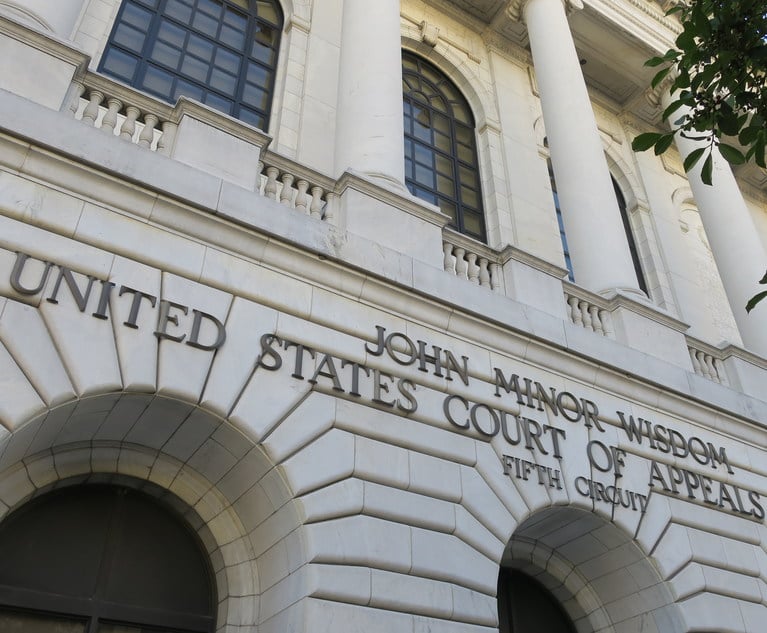At High Court, Lawyers Haggle Over Language in Appliance Repair Contracts
The New Jersey Supreme Court on Wednesday kicked off its 2018-19 term by hearing arguments over the enforceability of a mandatory arbitration clause in a consumer contract.
September 12, 2018 at 03:31 PM
4 minute read

The New Jersey Supreme Court on Wednesday kicked off its 2018-19 term by hearing arguments over the enforceability of a mandatory arbitration clause in a consumer contract.
Lawyers sparred over the issue of whether a mandatory arbitration clause in an appliance-service insurance contract barred a woman from filing a lawsuit in Superior Court alleging violation of the state Consumer Fraud Act, and related claims.
The lawyer representing the defendant companies asked the justices to overturn two lower courts who ruled that the arbitration clause was unenforceable because it contained no language prohibiting consumers from going to court if they were dissatisfied with the arbitration process.
Lori Grifa, representing defendants Home Warrant Administration of Florida and Choice Home Warranty, which has an office in Edison, said the language in the clause was “clear and unambiguous” and should have been enforced.
“Any dispute is to be exclusively resolved through arbitration,” said Grifa, of Haddonfield-based Archer & Greiner.
John Keefe Jr., the lawyer for plaintiff Amanda Kernahan, disagreed and urged the justices to affirm the two lower court rulings.
“Arbitration agreements are no more sacrosanct” than other contracts, said Keefe, of the Keefe Law Firm in Red Bank. “They're only guaranteed equal footing.”
According to court documents, Kernahan purchased a service contract from the defendants in 2015 to cover any possible repairs to her home appliances.
She canceled her contract that same year and requested and received a full refund, but after she had received more than $3,000 in payments to cover appliance repairs, according to the June 2017 unpublished ruling by Appellate Division Judges William Nugent and Heidi Currier.
Kernahan then had some type of unspecified dispute with the defendants and filed a lawsuit in Middlesex County Superior Court. She alleged violations of the Consumer Fraud Act and the state Truth in Consumer Contract, Warranty and Notice Act, and breach of the implied covenant of good faith and fair dealing.
The defendants moved for summary judgment dismissal, contending that Kernahan knowingly signed the contract and agreed to the terms of mandatory arbitration.
The contract stated: “Any and all disputes, claims and causes of action … shall be resolved exclusively by the American Arbitration Association.” The contract also barred any successful claimant from seeking counsel fees, treble damages or punitive damages.
Both the motion judge and the appeals court said the clause was unenforceable as written, in part because there was no language specifically barring a plaintiff from seeking recourse in the courts.
The Supreme Court granted certification in November 2017.
Grifa said the lower court rulings had to be overturned based on the U.S. Supreme Court's 2017 ruling in Kindred Nursing Centers v. Clark. In that case, the court, in a 7-1 ruling, overturned a ruling by the Kentucky Supreme Court that invalidated a mandatory arbitration clause because of language ambiguity and established a “clear-statement rule,” which established rules that must be followed for arbitration agreements to be enforced. Justice Elena Kagan, writing for the majority in Kindred, said the “clear-statement rule” unfairly placed arbitration clauses on a different plane than other dispute-resolution contracts.
“Any implication on arbitration cannot stand,” Grifa told the court.
Keefe said Kindred does not apply because it was not meant to invalidate “generally applicable contractual presumptions.”
“Don't abandon decades of sound, fundamental contract law,” Keefe said. “This contract is not an arbitration contract. There was no mutual assent here.”
This content has been archived. It is available through our partners, LexisNexis® and Bloomberg Law.
To view this content, please continue to their sites.
Not a Lexis Subscriber?
Subscribe Now
Not a Bloomberg Law Subscriber?
Subscribe Now
NOT FOR REPRINT
© 2025 ALM Global, LLC, All Rights Reserved. Request academic re-use from www.copyright.com. All other uses, submit a request to [email protected]. For more information visit Asset & Logo Licensing.
You Might Like
View All
Legal Issues to Watch in the US Appeals Courts in 2025


'Point Us to the Plain Language': NJ Supreme Court Grills Defense Statutory Requirements for Affidavit of Merit
5 minute read
3rd Circuit Judges Zero In on Constitutional Challenges to Medicare Drug Pricing Program
Trending Stories
Who Got The Work
J. Brugh Lower of Gibbons has entered an appearance for industrial equipment supplier Devco Corporation in a pending trademark infringement lawsuit. The suit, accusing the defendant of selling knock-off Graco products, was filed Dec. 18 in New Jersey District Court by Rivkin Radler on behalf of Graco Inc. and Graco Minnesota. The case, assigned to U.S. District Judge Zahid N. Quraishi, is 3:24-cv-11294, Graco Inc. et al v. Devco Corporation.
Who Got The Work
Rebecca Maller-Stein and Kent A. Yalowitz of Arnold & Porter Kaye Scholer have entered their appearances for Hanaco Venture Capital and its executives, Lior Prosor and David Frankel, in a pending securities lawsuit. The action, filed on Dec. 24 in New York Southern District Court by Zell, Aron & Co. on behalf of Goldeneye Advisors, accuses the defendants of negligently and fraudulently managing the plaintiff's $1 million investment. The case, assigned to U.S. District Judge Vernon S. Broderick, is 1:24-cv-09918, Goldeneye Advisors, LLC v. Hanaco Venture Capital, Ltd. et al.
Who Got The Work
Attorneys from A&O Shearman has stepped in as defense counsel for Toronto-Dominion Bank and other defendants in a pending securities class action. The suit, filed Dec. 11 in New York Southern District Court by Bleichmar Fonti & Auld, accuses the defendants of concealing the bank's 'pervasive' deficiencies in regards to its compliance with the Bank Secrecy Act and the quality of its anti-money laundering controls. The case, assigned to U.S. District Judge Arun Subramanian, is 1:24-cv-09445, Gonzalez v. The Toronto-Dominion Bank et al.
Who Got The Work
Crown Castle International, a Pennsylvania company providing shared communications infrastructure, has turned to Luke D. Wolf of Gordon Rees Scully Mansukhani to fend off a pending breach-of-contract lawsuit. The court action, filed Nov. 25 in Michigan Eastern District Court by Hooper Hathaway PC on behalf of The Town Residences LLC, accuses Crown Castle of failing to transfer approximately $30,000 in utility payments from T-Mobile in breach of a roof-top lease and assignment agreement. The case, assigned to U.S. District Judge Susan K. Declercq, is 2:24-cv-13131, The Town Residences LLC v. T-Mobile US, Inc. et al.
Who Got The Work
Wilfred P. Coronato and Daniel M. Schwartz of McCarter & English have stepped in as defense counsel to Electrolux Home Products Inc. in a pending product liability lawsuit. The court action, filed Nov. 26 in New York Eastern District Court by Poulos Lopiccolo PC and Nagel Rice LLP on behalf of David Stern, alleges that the defendant's refrigerators’ drawers and shelving repeatedly break and fall apart within months after purchase. The case, assigned to U.S. District Judge Joan M. Azrack, is 2:24-cv-08204, Stern v. Electrolux Home Products, Inc.
Featured Firms
Law Offices of Gary Martin Hays & Associates, P.C.
(470) 294-1674
Law Offices of Mark E. Salomone
(857) 444-6468
Smith & Hassler
(713) 739-1250






